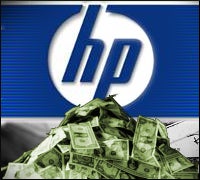 |
HP (NYSE: HPQ) showed staying power during its third fiscal quarter, narrowly beating Wall Street estimates and reporting profit down only slightly from the same quarter last year, despite the harsher business climate.
The company reported non-GAAP earnings of $2.2 billion or $0.91 per share, beating estimates by a penny, according to Thomson Financial. Revenue of $27.5 billion for the quarter ending July 31 declined only 2 percent from the same quarter last year and rose 4 percent in constant currency.
Including special expenses — such as the ongoing costs of HP’s EDS acquisition last year — the company saw GAAP earnings of $1.6 billion.
Part of the company’s success in the quarter stemmed from strong revenue from outside the U.S., which accounted for 62 percent of total revenue, HP said.
This quarter was solid for HP relative to expectations,” HP Chairman and CEO Mark Hurd said during today’s earnings call. “We are encouraged by [revenue] stability but are not ready to call it a turn. We have the potential to take advantage when the economy does turn around.”
The star of the earnings show was HP’s services division, with $8.5 billion in revenue, up 93 percent from a year ago due to the acquisition of services giant EDS.
“The EDS integration is tracking ahead of plan,” HP said in a statement.
Executives added during today’s call that the future will be better for services as new contracts get signed. “We’ve been winning deals,” Hurd said. “We feel pretty damn good about winning deals. Our funnel is up.”
He added that HP can earn more savings from the EDS acquisition. “Over 16,000 headcount have been removed to date as part of the EDS integration,” the company said in a statement.
Hurd explained that technology will deliver still more efficiencies. “The benefit is to resolve a problem without human intervention,” he said. “The cost to run a call physically versus remotely or electronically has a tremendous cost delta and customer satisfaction delta … We’ve gotten our technology platform better. We can solve problems with a minimum of human intervention and also improve customer satisfaction.”
Hard times in hardware
The flip side of the good news came from the hardware and software divisions. Revenue from Enterprise Storage and Servers (ESS) was $3.7 billion, down 23 percent from a year ago. HP Software revenue declined 22 percent to $847 million.
The Personal Systems Group (PSG) shipped 2 percent more units than a year ago but revenue declined 18 percent to $8.4 billion. Notebook revenue was down 10 percent and desktop revenue was down 26 percent.
The Imaging and Printing Group (IPG) reported a revenue decline of 20 percent to $5.7 billion.
Oddly enough, executives said they were cautious in part because they gained more market share in hardware than they had expected to. That could mean that other companies are doing worse than HP and that the overall market is smaller than HP would like it to be.
“We are modeling more modest market share gains,” HP CFO Cathie Lesjak said.
She explained that the market in Europe is particularly harsh, the U.S. is stabilizing, and Asia, especially China, is up.
Hurd said that the Chinese stimulus has benefited HP. “After China’s stimulus packages, corporate and consumer got directly into the market and helped,” he said.
Future plans
The good news from services came on the heels of a Reuters report that HP might sell parts of its star division to boost the company’s price-to-earnings ratio, which was just over 14 at market close.
HP held over $13.5 billion in cash and cash equivalents at the end of the quarter. Asked whether the company would use that cash to make acquisitions or to buy back stock, executives demurred.
“We want to get back to a positive net position within 12 to 18 months of the EDS acquisition,” Lesjak said. “We’re closer, but we have negative net cash of $3.2 billion.”
“There’s still work to be done,” she added. “Therefore, there will be moderated buybacks to cover the dilution from the employee benefit plan. We’ll look at it again once we get through this.”
HP said in a statement that it was “investing in the next-generation data center, digital printing, and mobility,” prompting one analyst during today’s earnings call to ask whether HP was building a mobile phone.
Hurd pointed out that the company already makes mobile phones. But he pointed to HP’s efforts in other areas of mobility: “The mini notebook opportunity has been positive for us,” he said, adding that netbooks have improved HP’s telecom channel.
Update adds comments from HP’s earnings call.


